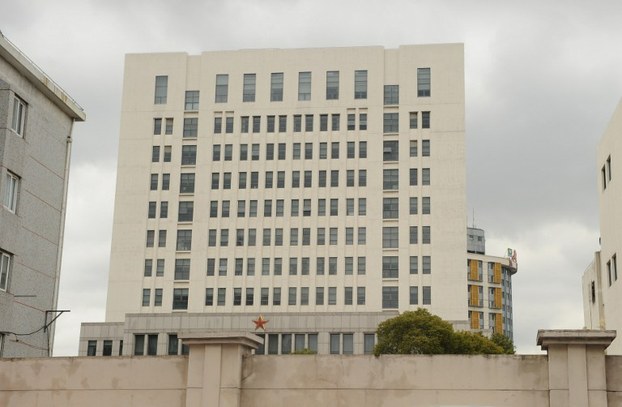




China on Tuesday hit out at U.S. accusations of cyberspying, summoning Ambassador Max Baucus and denying that five of its military officers hacked into the computer systems of American companies to steal commercial information.
Baucus met with assistant foreign minister Zheng Zeguang shortly after authorities in Washington charged the officers with espionage and accused them of hacking into American nuclear, metal and solar companies, the foreign ministry said in a statement on its website.
The indictment had seriously harmed relations between both countries, and Beijing "will take further action" on the matter, the foreign ministry quoted Zheng as saying.
The FBI named the five defendants on its website as Wang Dong,Sun Kailiang,Wen Xinyu,Huang Zhenyu and Gu Chunhui,all of whom are part of the third branch brigade of the Chinese military's Unit 61398.
But Beijing has labeled the charges "absurd."
"The Chinese government and military and its associated personnel have never conducted or participated in the theft of trade secrets over the Internet," Zheng was quoted as telling Baucus.
His protest came after China's Ambassador to the United States, Cui Tiankai, "made solemn representations" to the State Department on Monday.
"The accusations that the United States have made against these Chinese officials are purely fictitious and extremely absurd," official Chinese media quoted Cui as saying.
Indictment
U.S. Federal prosecutors said that all five defendants worked with the secretive People's Liberation Army (PLA) Unit 61398 based in Shanghai.
They were indicted by a grand jury in the Western District of Pennsylvania for computer hacking, economic espionage and other offenses.
The indictment alleges that the defendants conspired to hack into American entities and steal information that would be useful to the companies' Chinese competitors, including state-owned enterprises, the U.S. Justice Department said in a press release on Monday.
"This is a case alleging economic espionage by members of the Chinese military and represents the first ever charges against a state actor for this type of hacking," U.S. Attorney General Eric Holder said in a statement.
"The range of trade secrets and other sensitive business information stolen in this case is significant and demands an aggressive response," Holder said.
He said Washington wouldn't tolerate actions by any nation that sought to sabotage U.S. companies and undermine fair competition.
Victims
FBI Director James B. Comey welcomed the move.
"For too long, the Chinese government has blatantly sought to use cyberespionage to obtain economic advantage for its state-owned industries," Comey was quoted as saying in the press release.
The victims of the hacker attacks were named as electrical company Westinghouse, U.S. subsidiaries of Germany's SolarWorld AG, U.S. Steel, Allegheny Technologies, the United Steel, Paper and Forestry, Rubber, Manufacturing, Energy, Allied Industrial and Service Workers International Union and Alcoa.
The indictment specified 31 counts of "conspiring to commit computer fraud and abuse," which carries a maximum jail term of 10 years, between 2006 and 2014, as well as a string of other computer-related offenses.
China has already rejected claims that the PLA was behind a series of hacker attacks on U.S. corporate networks described in a February 2013 report by the security firm Mandiant.
Mandiant's 74-page report said it had traced a large number of transnational cyberattacks to IP addresses assigned to a building it said belonged to Unit 61398 in Shanghai.
The unit had stolen data, including intellectual property, from at least 141 companies since 2006, it said.
In the same month, the New York Times newspaper accused hackers traced to China of "persistently" infiltrating its computer networks over the last four months, also sparking an angry denial from Beijing.
Lack of ground rules
The indictment of the PLA officers is a clear sign that Washington and Beijing have been unable to agree to any ground rules when it comes to cyberespionage, Taiwan military affairs analyst Cheng Shaoru said.
He said the revelations of mass online surveillance by the U.S. National Security Agency (NSA) leaked by its former contractor, Edward Snowden had likely muddied the waters.
"Ever since the Snowden affair broke, there have been some subtle changes in the attitude of the international community towards American demands," Cheng said.
"It's likely that U.S. actions in this area were no worse than those of the Chinese government, so we have a scenario where each side is taking their own line," he said.
He said the charges had served to highlight a divide that likely already existed behind the scenes.
"It shows that the two sides are lacking any sort of consensus on the rules of the game when it comes to cyber-security or cyberespionage," Cheng said.
'No holds barred'
Meanwhile, Ling Bing, Associate Director of the Center for Asian and Pacific Law at the University of Sydney, said Beijing was bound to be unhappy at being publicly named and shamed by the U.S.
"But the Chinese defense ministry's denial referred to the theft of commercial secrets over a computer network," Ling wrote on his verified account on the Twitter-like service Sina Weibo.
"But when it comes to all other kinds of non-commercial secrets, it'll be no holds barred," he said.
Since June 2013, Snowden's disclosures have exposed U.S. cyberspying efforts against China, including Chinese companies.
Some disclosures specifically showed the U.S. penetrating Chinese telecommunications giant Huawei, which U.S. officials say is a vehicle for Chinese government cyberspying, the Wall Street Journal reported on Monday.
It said the Obama administration had "struggled" in the wake of those disclosures to regain the upper hand.
"U.S. officials privately acknowledge they spy on companies for foreign intelligence purposes, particularly those they believe are at least in part state-controlled, but they say they won't steal corporate secrets to provide an advantage to U.S. companies," the paper said.
Reported by Yang Fan for RFA's Mandarin Service. Translated and written in English by Luisetta Mudie.